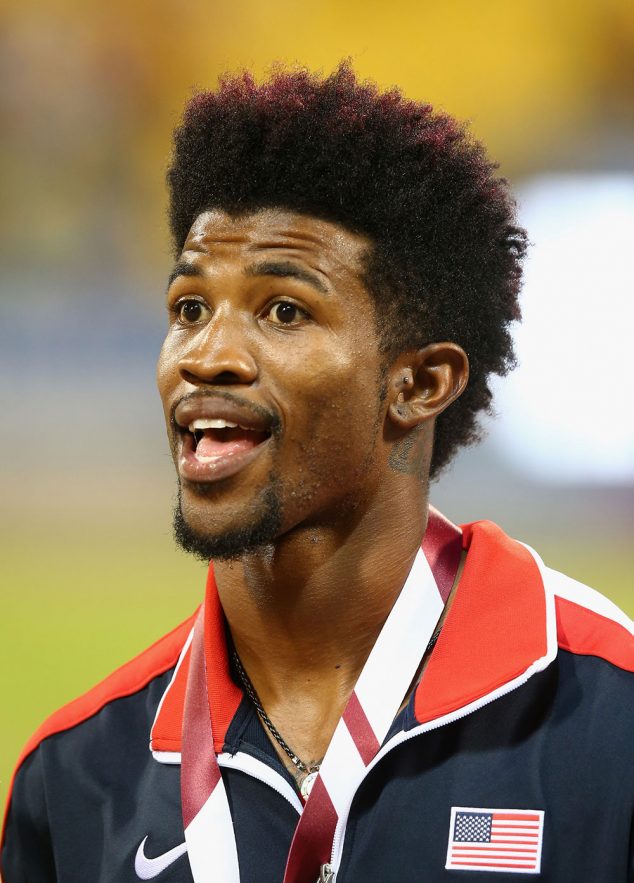When Paralympic sprinter Richard Browne walks, his head is high, his shoulders are straight and there’s always a smile on his face. Even though he’s missing his right leg.
“It’s just a day at a time, because you don’t even know if you’re going to be here tomorrow,” Browne says. “I took that from my accident. I lost my leg when I was 19. Before that, I was just a typical teenager.”
Now the Jackson, MS-born, Atlanta, GA-raised Browne has world records in the 100 meter and 200 meterIPC Athletics World Championships. The 24-year-old says he’s living the dream and trying to use his platform to change the world, all while gearing up for the 2016 Olympics in Rio.
“I want to touch a generation,” Browne says. “I want to touch the world. I do that by running fast. I do that by showing people you can do anything you want to do.
“America has to wake up to the fact that not only are disabled people here, but we’re amazing, awesome people who love life and do everything that you guys do. We do amazing things despite being in a wheelchair, having a prosthetic leg, being blind or not being able to hear. We deal with those things on a day-to-day basis, but it’s life. We don’t care. Just like able bodies have to deal with things that disabled people don’t have to deal with. Everybody has their limitations. It’s what you do with those limitations, how much you can push those limits is what makes you a great person. Not the fact that you’re a disabled person.”
Browne says that his mother should get the credit for raising such an upbeat young man. He’s the second oldest in a family of 10 siblings. Two of his brothers play college basketball, and another plays college football. His little sister runs track, while his older brother (also named Richard) played professional basketball in Europe.
Browne’s whole family is both insanely athletic and competitive, which is where his dramatic rise up world rankings comes from. (He had never ran track before his accident.) His mother was a huge Michael Jordan fan and his father was a football player. Browne himself played high school football and loves soccer (Liverpool fan). But Jason Williams made him fall in love with basketball and Allen Iverson made him believe in the impossible.
“Seeing AI carry his team, that’s probably my standout basketball moment, was watching those Finals,” Browne says. “Seeing AI step over Tyronn Lue… He carried his whole team. AI vs one of the best dynamic duos ever.”
In the 2012 U.S. Paralympic Track and Field Trials, Browne competed in the high jump, finishing with the Silver Medal. On the court, Browne says he was using those bunnies and dunking on people’s heads whenever he got the ball.
“When I did play basketball, I was a forward,” Browne says. “I just want to drive, I don’t want to shoot at all. I’ll dunk on you all day long. My vertical in high school was 41.”
After catching posters on the high school hardwood, Browne used to go to the Highlight Factory in Atlanta to see Joe Johnson’s slow-ass game and Josh Smith’s aerial abilities. “He was so slow,” Browne says about Johnson. “He’s telegraphing the moves but you could never guard him.”

These days, Winged Foot’s favorite player in the League is Paul George. He first related to PG because the Pacers superstar broke his right leg, the leg that Browne’s missing. But he now uses the Pacers in 2K and keeps up with the real life version of George because of the way “he balls out.”
Browne is also balling out right now. Before competing in both the Olympic and Paralympic Games in 2016, he’ll run a major able-bodied meet in March, the first runner with a prosthetic to do so since Oscar Pistorius. But when you can run the 100 meters in 10.61 seconds, it doesn’t matter how many legs you have.
“There’s not a person in the world besides Usain Bolt that can run with me at full speed. My top speed is 25.1 mph, and Bolt’s is, like, 26,” Browne says. “I’m an athlete first. Then I’m disabled.”
Browne and his trainer Hayley Ginn plan to train six days a week to get ready for Rio. He’ll start with three sessions a day, then two sessions and then eventually he’ll sprint nonstop for six straight weeks. But in the meantime he’ll be in the gym, doing heavy lifting and technical drills, trying to perfect his stride frequency and length. He’ll work to somehow get faster.
But the most important part for Browne, he says with a smile, isn’t running or being famous or making money—it’s helping kids, and America, understand that being disabled isn’t the end of the world.
“I walk into hospital rooms where people are tearing, crying because they just lost their leg and they don’t know what is going to happen now,” Browne says. “No. Relax. Life is fine. You’re going to be fine. You can be just as confident and beautiful and all those awesome adjectives.”
When talking about the work he’ll put in for Rio, that smile goes away. Browne’s focus is razor sharp. He’s hungry, and he’s ready to make his mark in the record books. Again.
“I don’t care who you are,” Browne says. “I’m going to run you down and I’m going embarrass you. I take that mentality every race. What I’m finna do right now, I want people to say, ‘Wow.’ That’s my goal.”
And with that, Browne is off on his way, smiling and walking with his head held high, talking about how clutch Larry Bird was. “Pure shooter,” he says of Legend. “You couldn’t stop him.”
Just like nobody can stop Browne.
Photos courtesy of Getty